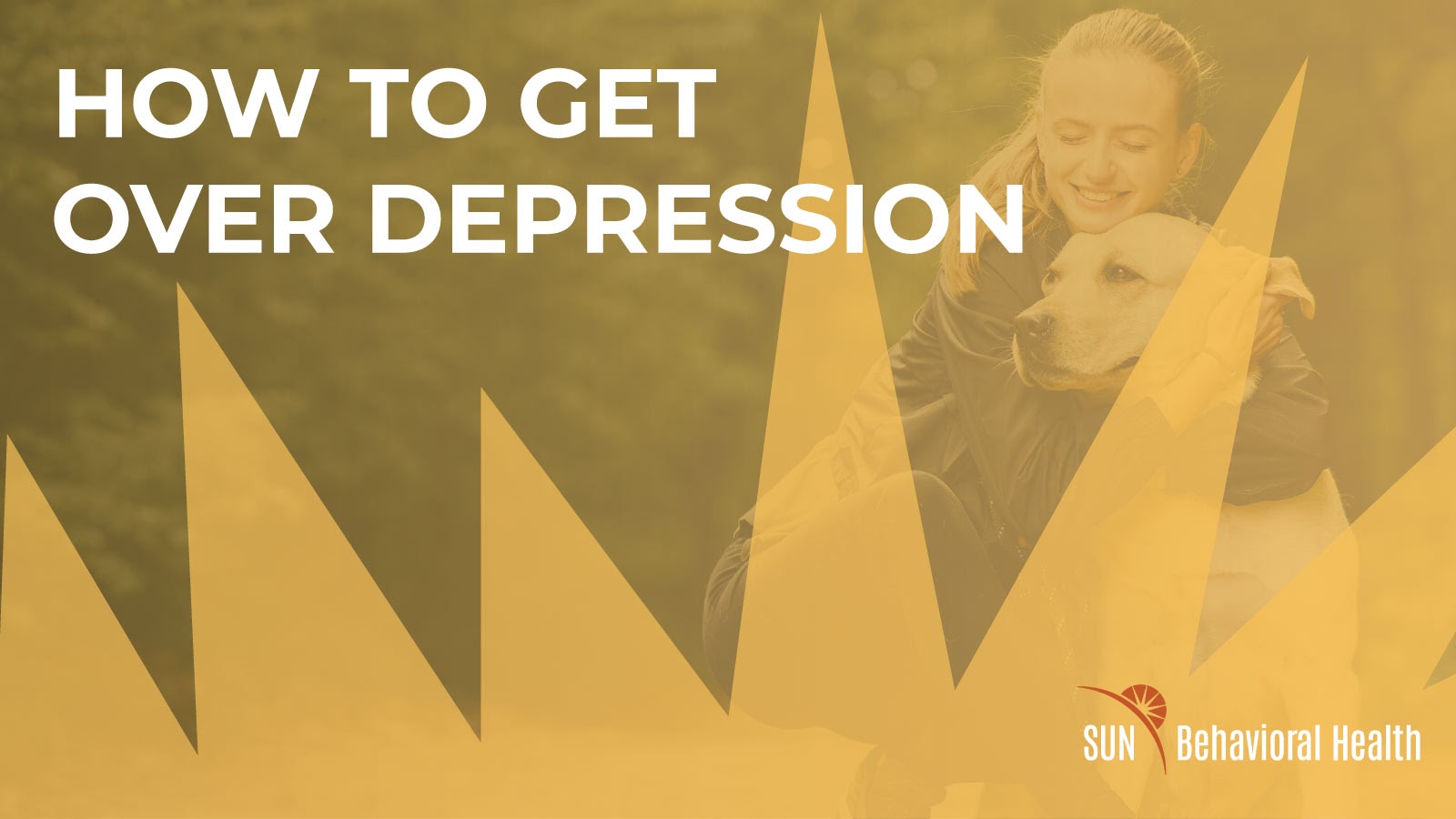Services
- Home
- Mental Health Services
- Who We Treat
- How We Treat
- Patients & Visitors
- About
close

Here’s the thing about depression: When you’re not in that state of mind, you are very well versed in all the right things to do. You have a clear mind and can look at things in your everyday life in a typically productive manner.
Yesterday, when I started thinking about this, I found my thoughts wandering right away and could only think of the topic as a seemingly insurmountable one I wasn’t feeling prepared to understand. Today? I’m back to my normal state of mind—lucky for me—and can approach the topic with a whole different mindset.
We all know the “put your oxygen mask on first” approach mentioned in airplane safety procedures. If everyone gets light-headed and loses consciousness, there is no one able to help. This scenario can be somewhat similar to helping someone with depression. They are not in a healthy mindset to simply “get over it.” They need someone in a better frame of mind to assist them.
I am very different from my older sister, for instance. She has a long history of depression-—which in turn means our family has a long history of depression. That’s because one person’s state of mind can affect everyone around them. We had to understand it fully to be able to help her (and ourselves!) along the way.
For the longest time, my sister would always call me and tearfully cry that she was so weak.
“Why can’t I be like everyone else?”
“I just want to end it all.”
“Please help me.”
All of these pleas had different effects on me.
One day I would be lost myself, despairing that she had mental struggles. We’d often sit on the phone silently, me offering my companionship simply by holding the phone. Another day I’d see her number pop up on caller ID and ignore it, knowing I had too much to get done to “handle her” that day. Feelings of guilt would wash over me.
Every so often, I would call her husband (her other “go-to” for support) and say I was REALLY worried she might harm herself. Her constant use of the words “over with” put us either in a panic or just-another-day mode, as callous as that may sound. We had to listen very carefully to make our observations and decide what to do to the best of our ability.
There are many other details I haven’t addressed but want to mention briefly because when someone is diagnosed with depression, oftentimes their loved ones are also impacted in various ways. These include:

While most people feel depressed from time to time, my sister suffers from major depression, which is considered as having depression lasting longer than two weeks. Not everyone with major depression has the same frequency or length. Some might have it chronically, which means throughout life, while others have periodic episodes.
Depression is relatively common in today’s world, with 17.3 million Americans suffering at least one major depressive episode, as of 2019. It is more common among women than men, with an 8.7% to 5.3% ratio. Sixty percent of adolescents and 35% of adults do not receive any type of treatment for depression.
Genetics are generally perceived to be a contributor to the condition, but a medical condition or substance misuse can also trigger depression.
Looking back on all of this, I just wish we knew then what we’ve learned through years of experience. My sister wasn’t going to “get over” her depression. Her depression was going to exist, but how it came to be managed was key.

Blood work and a full examination should rule out any vitamin deficiencies or other contributing physical factors for your depression. Your doctor may refer you to a psychiatrist if medications are going to be considered.
Cognitive behavioral therapy is evidence-based and shows new ways of thinking so you can work to train your brain. You will see through a new lens that will allow you to focus your thoughts on more productive ones. Reaching out for ongoing counseling with a mental health professional who understands your depression diagnosis can be a key component to managing your depression.
Psychiatrists may add medications that can be helpful for people who receive counseling but still struggle in managing their depression. Going down that road may take time though, because medications affect individuals differently. Someone may not respond well to a medication’s side effects and another person may not notice any change in mood from the medication.
In addition to time adjustment related to the type of medication, you will need to allow for dosage levels to be adjusted. These medications must be gradually introduced. They take time to show any effect and also must be slowly and carefully stopped—it’s not as simple as day one, take this, day two, try this instead. Doctor appointments to follow medications will also need to be allowed in your schedule.
Adding positive activities to reinforce daily routines and things that need to be done. If you live with someone or have a partner, preparing meals together can be an engaging activity to start or end your day. Maybe try a program together like Noom or even a yoga class. Make it a fun challenge and take turns choosing the class (one week a spin class, the next week Tai Chi) or just schedule weekly walks.
This is a fun list to make. Don’t be overwhelmed because the idea here is two-fold. Have fun, but be prepared to look back here when you are feeling down. For those really low times, at least having a start with a ready-made list can be helpful. On those days, maybe reading the list is enough to remind you of something other than your depression. Maybe over the next day or two you call a recovery center you’ve been meaning to but keep putting off.
So take a big breath, grab a pen, and get writing. The key here is to keep the list posted where you’ll readily see it, such as on the refrigerator door, the bathroom mirror, or by your bedside, maybe even in a frame so it doesn’t get lost.
Here’s a list of possibilities to choose from:
Volunteer where you have a passion. Do you like helping seniors? Maybe you can call a nearby activities director at a nursing home and see what help they need. If dogs are your thing, see if you can make some side cash as a dog walker or volunteer at a shelter to clean kennels or take dogs for outside time.
This might not sound like fun, but you might be amazed after some time passes how helpful a routine can be in life.
A schedule developed by you can keep your brain accountable to complete activities and tasks. This allows you to manage time effectively when you don’t know what you should be doing next or feel unmotivated to even roll out of bed. You start the day, or end it, with a shower. That’s what gets you moving or what you work toward throughout the day. In between, you might want to complete just a few daily tasks considered essential and these might even be baby steps.
But the end goal is each task builds toward the next.
You might be surprised to learn this became my sister’s path and filtered directly to her husband and me. At her counselor’s suggestion, when she noticed herself entering a crying jag she allowed for whatever length of time seemed reasonable, which for her was 20 minutes.
By crying for 20 minutes and believing, in her words, that anything beyond that was “indulgent,” she was allowing herself her feelings without descending into a full spiral. Each time she picked herself up to continue on made her feel stronger. We also knew we could answer the phone and be there for specific amounts of time, rather than imprisoned by emotions for unknown amounts of time.
Keeping on top of steps one through five is important. Along with them, the sixth step is there to keep adjusting the actions, seeing how things are going, and making adjustments when needed. This last step is my sister’s ongoing path, which she has successfully used for 18 years and is light years ahead of where she started.

As mentioned earlier, women may experience depression at a higher rate than men, but everyone can have a level of depression, from childhood through the teen years and even the elderly.
If a person is struggling with basic hygiene and can’t even fathom doing anything on this list, they may need help in an inpatient treatment center or through outpatient care until they can get to a stronger place to manage their depression independently.
There are also occasions where people in therapy do not respond to medications. Their daily functioning can decline and their lives can even be at stake if they begin to decline to suicidal ideation. SUN Behavioral Houston offers electroconvulsive therapy (ECT) treatment as an outpatient option in those cases.
ECT, which studies have proven is the most-effective method to treat severe depression, works through brain stimulation, with a patient sedated and monitored in a medical setting. An estimated 100,000 people in the United States opt for ECT treatment each year, which has been proven to give effective, fast-acting results. One million people worldwide per year choose ECT treatment.
Whether your depression is mild, debilitating, or somewhere in between, SUN Behavioral Houston is here to help you and your loved ones get the mental health assistance you need. Our values of teamwork, integrity, compassion, and safety are at the forefront of our best-in-class services. Call us at (713) 796-2273
What's the Number One Cause of Depression?
Genetics is the key contributor that can be linked to an increased risk of developing depression. There is not a known gene to show a direct link, but brain studies have shown a relatively smaller hippocampus in many people clinically diagnosed with depression.
This area is where receptors are located to receive serotonin, which is important for emotional processes. Medications are initially approached to boost serotonin. Other internal influences, such as substance use disorders, prolonged medical conditions, or brain injuries can also affect a person’s mood.
External influences include isolation, trauma, abuse, financial hardships, grief, and even happy occasions like a birth or a wedding can be trying on the emotions.
How Long Does it Take to Treat Depression?
Medications may take two to four weeks to see noticeable changes. It is not unusual to try several medications, which would increase this time. Counseling typically shows measurable changes within three months.
Depression is highly treatable, responding well to therapy, medication, or both. Whether the depression occurs with lengthy delays between episodes, you may experience a situational depression or need to manage it throughout your life.
How Can We Solve Depression?
That is the age-old question. There is not a gene defect that has been identified, therefore depression is approached in the style of treatment rather than cure. It is highly treatable and as stigma reduces for people to seek counseling, hopefully, the numbers stated earlier for those who do not get treated will begin to change.
Can Depression Be Reversed?
No. Depression cannot be reversed. There are many different coping strategies that a counselor can show you and medications that can be prescribed to treat depression.